5 Best Ways To Use Apple Cider Vinegar For Diabetes
Include this liquid in your diet and reap its many benefits for blood sugar management
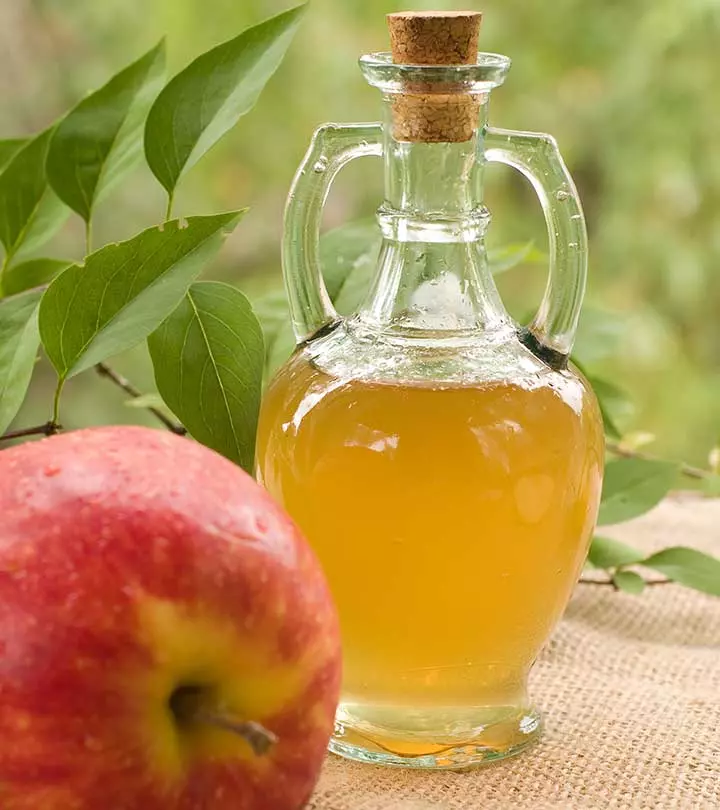
Image: Shutterstock
There are several advantages of using apple cider vinegar for diabetes management. In the United States, diabetes affects more than 30 million adults. During the past two decades, diabetes cases among adults have doubled (1).
According to some studies, apple cider vinegar can treat diabetes (2). Vinegar may promote blood sugar control by enhancing carbohydrate metabolism. Managing diabetes symptoms may become easier with ACV since it promotes blood sugar metabolism.
Further research is needed to understand how ACV may contribute to diabetes treatment. This article discusses the benefits of apple cider vinegar, how to use it and side effects. Keep reading.
 Know Your Ingredient: Apple Cider Vinegar
Know Your Ingredient: Apple Cider VinegarWhat Is It?
Vinegar made from crushed apples, yeast, and sugar through fermentation.
What Are Its Benefits?
It may lower bad cholesterol and regulate blood sugar levels.
Who Can Consume It?
Can be used by all adults.
How Often?
Can be consumed regularly, as required.
Caution
Consult with a doctor while consuming it alongside other regular medications.
In This Article
What Research Says About Apple Cider Vinegar And Diabetes
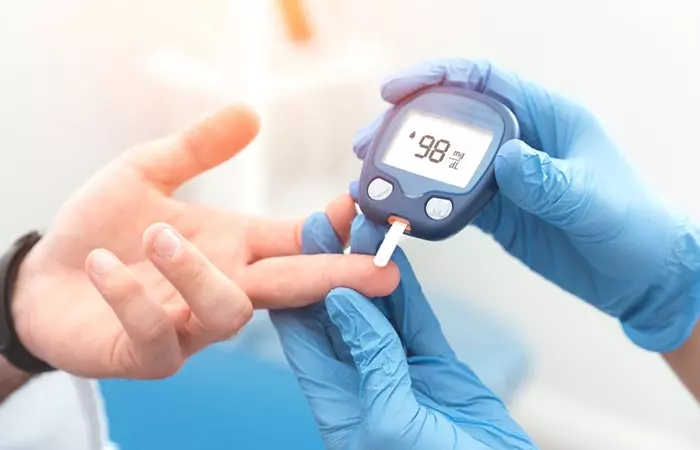
An Iranian study conducted on rats stated that ACV might have positive effects on blood cholesterol levels. ACV could lower bad cholesterol levels and elevate good cholesterol levels in diabetic rats (3).
Another small study found that ACV could regulate the levels of blood sugar and insulin in the case of type 2 diabetes (4).
However, some anecdotal evidence states that ACV may actually worsen glycemic control, and this may aggravate diabetes symptoms. A few other theories suggest that ACV may slow down the rate at which food and fluids leave the stomach, making it harder for any individual to control blood sugar.

ACV may also interact with certain medications, and its strong taste may not be okay for all.
Diabetes mellitus is caused by a lack of insulin production by the pancreas or insulin resistance (2). While apple cider vinegar has been used to improve insulin sensitivity and digestive health, it may also promote weight loss (4). It can thus potentially reduce the risk of metabolic syndrome and diabetes while also providing important health benefits that can be enhanced through proper nutrition and practice of alternative medicine approaches.
That’s a bag of mixed results. What’s the conclusion? Should you try it? ACV is not harmful, per se. It is considered safe and can be worth a try. But ensure you use organic, unfiltered, and raw ACV – because it will be higher in beneficial bacteria (and it appears cloudy too).
 Trivia
TriviaHere are the various ways you can use ACV to aid your diabetes treatment.
Key Takeaways
- Consuming apple cider vinegar may promote blood-sugar metabolism and may aid in managing diabetes.
- Having 1-2 tablespoons of diluted ACV with cheese may be beneficial for people with type II diabetes.
- You can consume ACV along with other natural products like honey and cinnamon for extra benefits.
- Consider using organic, unfiltered ACV for maximum benefits, and consult a doctor before incorporating it into your diet.
How To Use Apple Cider Vinegar For Diabetes
1. Apple Cider Vinegar And Water

What You Need
- 2 tablespoons of ACV
- 2 tablespoons of water
- 1 oz cheese
What To Do
Mix the ACV and water. Consume the mixture, along with the cheese, before bedtime.
How Often You Should Do This
Try it for a week, and consult your doctor post the results. Follow their advice.
Why This Works
ACV contains acetic acid, which is known for its antiglycemici A substance that helps lower glucose levels in the body, commonly used in the treatment of diabetes mellitus. effects.
The acid can reduce starch digestion. Cheese and vinegar may have a synergistic effect. Cheese also contains amino acids that provide glucogenic substrates, which may benefit people with type 2 diabetes (these substrates, in the presence of insulin, convert to glycogeni The liver stores glucose in the form of glycogen to help maintain optimal blood sugar levels in the body. ) (5).
 Trivia
Trivia2. Cinnamon And Apple Cider Vinegar

What You Need
- 1 teaspoon of ACV
- ¾ teaspoon of ground cinnamon
- 1 teaspoon of stevia
What To Do
Mix all the ingredients and take the concoction post meals.
How Often You Should Do This
Twice a day. Consult a doctor post results.
Why This Works
Cinnamon can help lower fasting blood glucose
(6). Though stevia sweetens the drink, it has a glycemic index of zero and is not absorbed by the intestines.
3. Honey And Apple Cider Vinegar

What You Need
- 1 teaspoon of ACV
- 1 teaspoon of honey (or even less)
- ½ cup of water
What To Do
Mix all the ingredients and take the drink post meals.
How Often You Should Do This
Once or twice a day. Visit your doctor post the results.
Why This Works
Honey can offset the acidic taste of ACV.
It may not have the same effect on blood sugar levels as sugar does and could be a healthy substitute. Some research shows that honey may also help in the management of diabetes (7).
Caution
Use honey only if your diabetes is well maintained. Otherwise, it is better to skip it or replace it with stevia.
4. Baking Soda And Apple Cider Vinegar
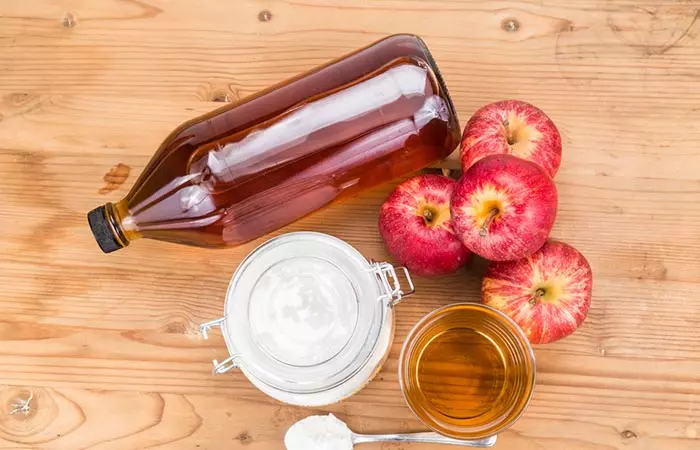
What You Need
- 2 tablespoons of ACV
- ½ teaspoon of baking soda
- A couple of orange wedges
What To Do
- Add one-fourth teaspoon of baking soda to a glass tumbler.
- Pour the entire ACV into the tumbler and stir thoroughly.
- Drink the mixture.
- You can eat or suck on the orange wedges. This can remove the sour taste of ACV from your mouth.
How Often You Should Do This
Thrice a day.
Why This Works
The mechanism of baking soda in diabetes treatment is anecdotal. Some animal research suggests that baking soda may help prevent an infection called mucormycosisi A serious fungal infection that may cause breathlessness, sinus congestion, fever, or one-sided facial swelling. , which is a diabetes complication (8).
Caution
In case you have a digestive condition that affects the mouth, esophagus, stomach, or intestines, talk to your doctor before using this remedy.
5. Bragg Apple Cider Vinegar
This is not a separate remedy as such. Bragg is a popular brand of apple cider vinegar that is widely known for its quality. It was founded by Paul Bragg in 1912 and claims to control weight gain that is so commonly associated with diabetes.
Megan Ruth, a blogger, shared her experience of consuming apple cider vinegar. She writes on her blog, “I mean, I had given up on apple cider vinegar years ago, but then one day I had an idea. This idea included apple cider vinegar and a combination of other flavors….a few other ingredients like cinnamon (which they say helps with weight loss and boosts your immune system), lemon juice (vitamin C boost, detox, and digestion aid), and honey (help prevent cancer, regulate blood sugar, and more). Basically, I started combining all of these oh so awesome and powerful ingredients to create an actually drinkable and Super Hero version of apple cider vinegar (i).”
You can use Bragg Apple Cider Vinegar in the remedies we have discussed above. But we recommend you talk to your doctor before using the product. Though the drink is safe to consume, there are certain apple cider vinegar side effects as well and thus may not be ideal for everyone. Read on to know more.
Who Should Not Consume Apple Cider Vinegar?
Apple cider vinegar is healthy and may aid diabetes treatment when consumed in moderation. But over-consumption may cause nausea. That said, intake of ACV is forbidden for those with:
- Indigestion
- Erosion of tooth enamel
- Low potassium levels
- Kidney disease
Individuals taking certain medications like diuretics, insulin-stimulating or potassium-lowering medications must also avoid ACV intake. Consult your healthcare provider to learn more about its safety and efficacy, and check for any other alternatives that may suit your current health condition.
While some individuals must entirely avoid apple cider vinegar due to health concerns, those with diabetes may take extra care when incorporating it alongside their medications, but as per a doctor’s advice, of course. Scroll down to know more.
Precautions For Using Apple Cider Vinegar With Diabetes Medications
- If you take insulin or medications that reduce blood sugar, speak with your doctor before including ACV in your routine.
- Monitor your blood sugar frequently and regularly to prevent hypoglycemia.
- To lessen the negative effects of acidity, dilute ACV (for example, 1–2 tablespoons in a glass of water).
- Start with small amounts to assess tolerance before increasing intake.
- If you have digestive problems, do not take ACV on an empty stomach.
Managing diabetes requires more than just ACV precautions, and incorporating smart lifestyle choices can help maximize its benefits. Scroll down to know more.
Best Lifestyle Practices To Complement ACV For Diabetes
- Select low-GI foods such as non-starchy vegetables, beans, and lentils to keep your blood sugar levels steady.
- Take part in moderate activity, such as brisk walking or cycling, for at least half an hour on most days of the week.
- A short walk after eating can help lower post-meal blood sugar levels.
- Drinking adequate water supports the removal of excess sugar and promotes renal function.
- Consuming fermented foods, yogurt, and kefir helps to maintain gut health, which benefits blood sugar management.
- Use relaxation methods like deep breathing or meditation because prolonged stress causes blood sugar levels to increase.
- Aim for 7 to 9 hours of good sleep every night because insulin resistance may occur from insufficient sleep.
Infographic: How To Consume Apple Cider Vinegar
Apple cider vinegar seems like a medicinal elixir that can help with diabetes and other health issues like weight management. However, consuming apple cider vinegar incorrectly can do more harm than good.
Check out the below infographic to learn how to consume apple cider vinegar properly.
Some thing wrong with infographic shortcode. please verify shortcode syntax
Apple cider vinegar for diabetes has shown promising results. Consuming ACV can be one of the ways to lower blood sugar effectively and also manage cholesterol levels. In addition, having it with cheese, cinnamon or honey helps manage blood sugar levels. However, caution is highly advised as it may also lower blood sugar levels way too much. Use organic ACV after taking advice from your doctor. To manage the sour taste of ACV, you can eat some orange wedges.
Frequently Asked Questions
Can apple cider vinegar reverse diabetes?
No, while apple cider vinegar may help improve insulin sensitivity and lower blood sugar levels, it cannot reverse diabetes (4). You may only use it as a complementary approach alongside the right medication and a healthy lifestyle on the recommendation of a doctor.
Can you take apple cider vinegar with metformin?
Some believe taking apple cider vinegar along with metformin may lower blood sugar levels way too much. However, there is less research available. Please consult your doctor before taking ACV with the medication.
Can you take apple cider vinegar with diabetes medication?
Though there are not enough studies to show the safety of the combination, taking apple cider vinegar with diabetes medication may result in dangerously low sugar levels. Therefore, it is best to consult a doctor beforehand.
What medicines cannot be taken with apple cider vinegar?
Apple cider vinegar may interact with diabetes medication, insulin shots, and diuretic drugs. It may also lower potassium levels in the body. Therefore, consult a doctor before taking ACV.
Illustration: Best Ways To Use Apple Cider Vinegar For Diabetes

Image: Stable Diffusion/StyleCraze Design Team
Apple cider vinegar can effectively help you alleviate some symptoms of diabetes. Watch this video to learn why ACV is beneficial and how it can help you manage diabetes.
Personal Experience: Source
StyleCraze's articles are interwoven with authentic personal narratives that provide depth and resonance to our content. Below are the sources of the personal accounts referenced in this article.
i. Actually Delicious Apple Cider Vinegar Tea {healthy, allergy free}https://alohamoraopenabook.blogspot.com/2017/03/actually-delicious-apple-cider-vinegar.html
References
Articles on StyleCraze are backed by verified information from peer-reviewed and academic research papers, reputed organizations, research institutions, and medical associations to ensure accuracy and relevance. Read our editorial policy to learn more.
- About Diabetes, Centers for Disease Control and Prevention.
https://www.cdc.gov/diabetes/about/?CDC_AAref_Val=https://www.cdc.gov/diabetes/basics/diabetes.html - Diabetes Control: Is Vinegar a Promising Candidate to Help Achieve Targets? Journal of evidence-based integrative medicine, US National Library of Medicine, National Institutes of Health.
https://www.ncbi.nlm.nih.gov/pmc/articles/PMC5954571/ - Apple cider vinegar attenuates lipid profile in normal and diabetic rats, Pakistan Journal of Biological Sciences, US National Library of Medicine, National Institutes of Health.
https://pubmed.ncbi.nlm.nih.gov/19630216/ - Vinegar Consumption Increases Insulin-Stimulated Glucose Uptake by the Forearm Muscle in Humans with Type 2 Diabetes, Journal of Diabetes Research, US National Library of Medicine, National Institutes of Health.
https://www.ncbi.nlm.nih.gov/pmc/articles/PMC4438142/ - Vinegar Ingestion at Bedtime Moderates Waking Glucose Concentrations in Adults With Well-Controlled Type 2 Diabetes, American Diabetes Association.
https://care.diabetesjournals.org/content/30/11/2814 - Anti-diabetic and antioxidant effect of cinnamon in poorly controlled type-2 diabetic Iraqi patients: A randomized, placebo-controlled clinical trial, Journal of intercultural ethnopharmacology, US National Library of Medicine, National Institutes of Health.
https://pubmed.ncbi.nlm.nih.gov/27104030/ - Honey and Diabetes: The Importance of Natural Simple Sugars in Diet for Preventing and Treating Different Type of Diabetes, Oxidative Medicine and Cellular Longevity, US National Library of Medicine, National Institutes of Health.
https://www.ncbi.nlm.nih.gov/pmc/articles/PMC5817209/ - Bicarbonate correction of ketoacidosis alters host-pathogen interactions and alleviates mucormycosis, The Journal of Clinical Investigation.
https://www.jci.org/articles/view/82744
Read full bio of Alexandra Dusenberry
Read full bio of Ravi Teja Tadimalla
Read full bio of Arshiya Syeda
Read full bio of Aparna Mallampalli







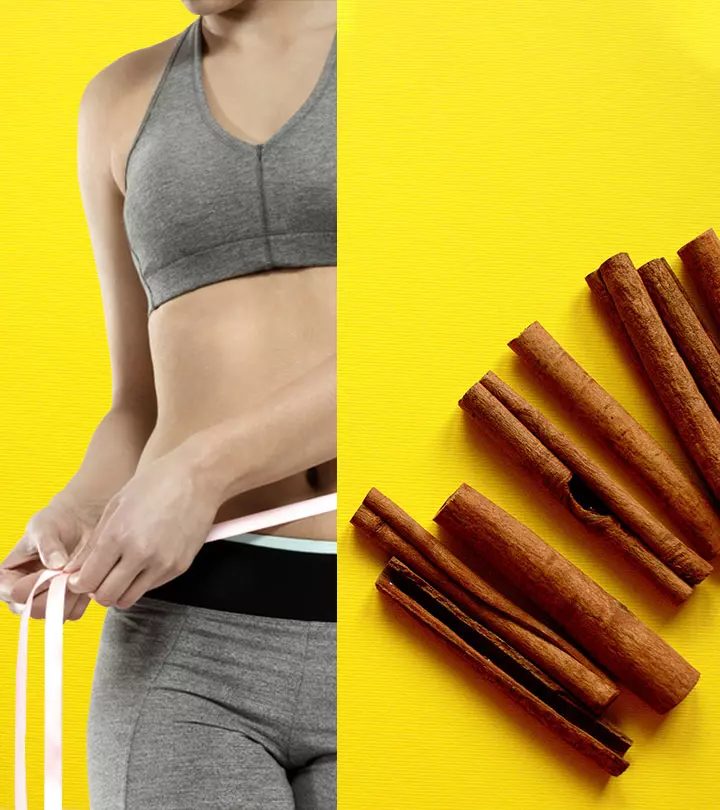
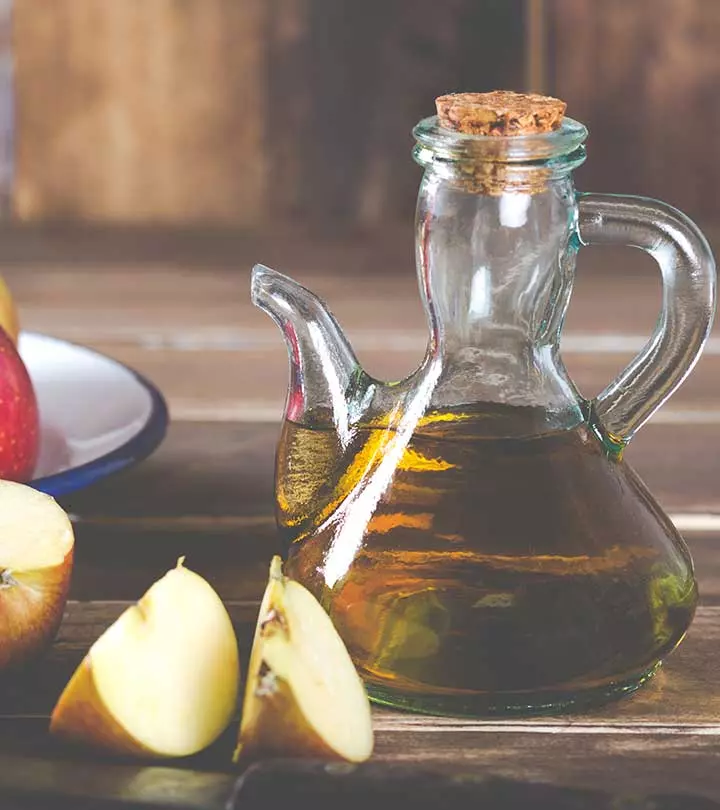


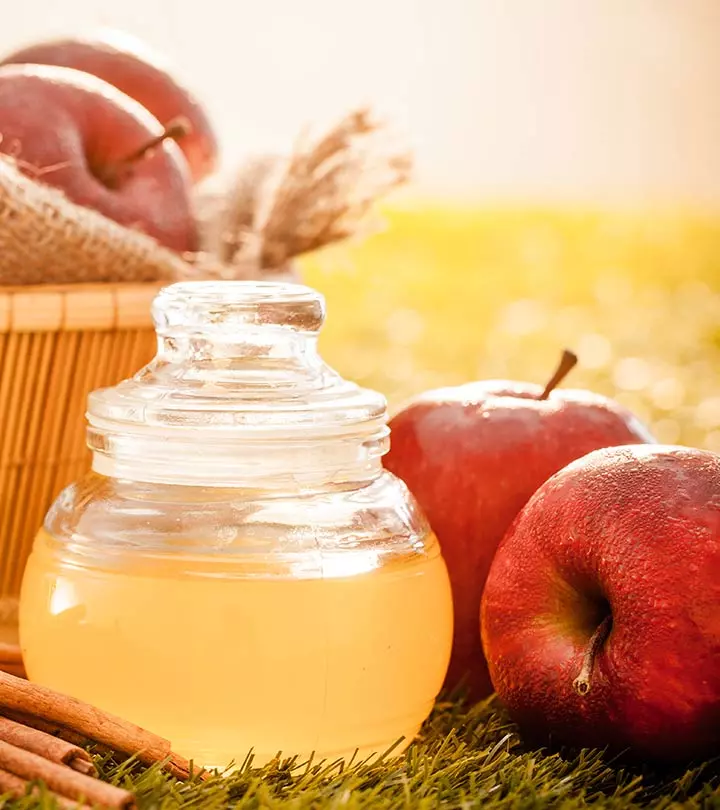


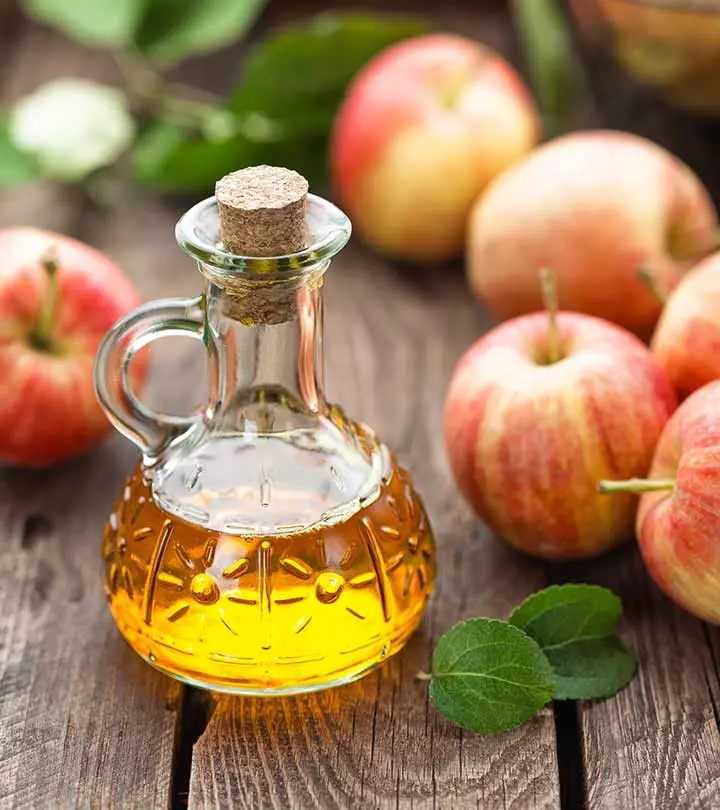



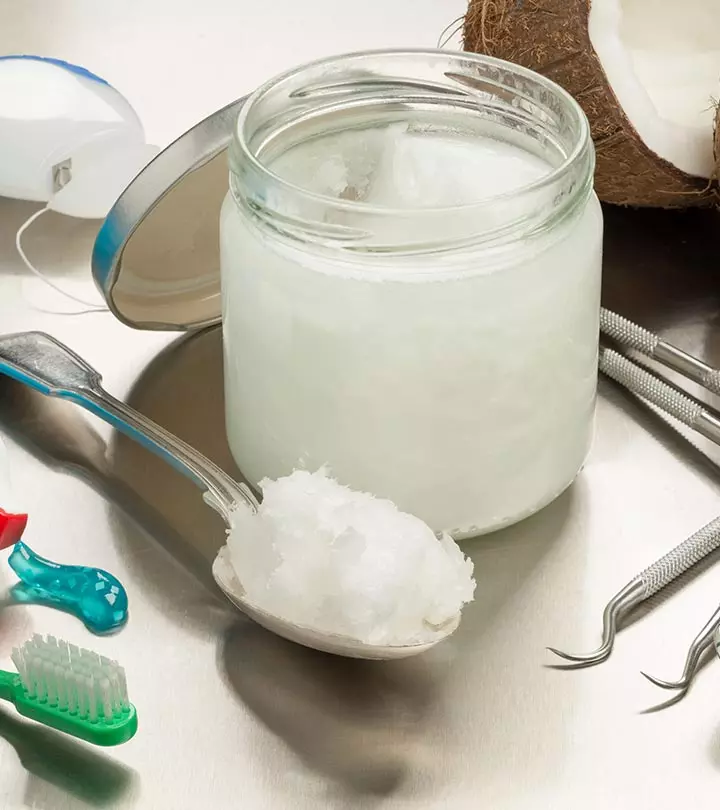

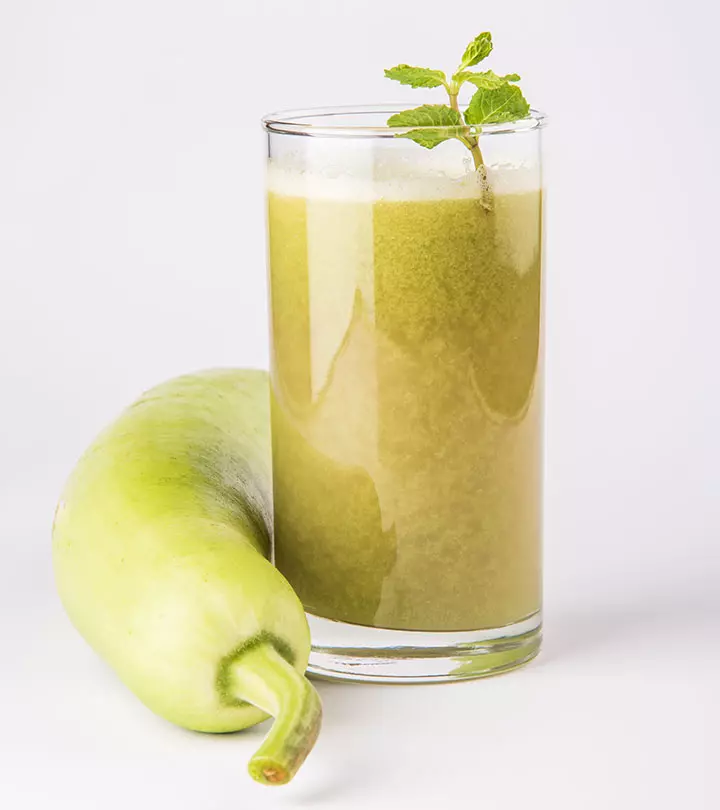
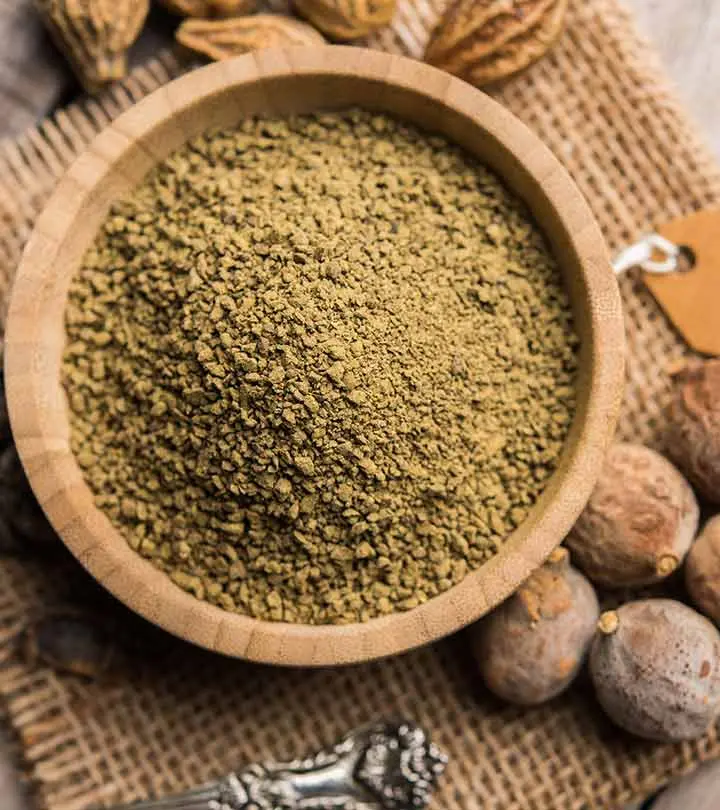





Community Experiences
Join the conversation and become a part of our empowering community! Share your stories, experiences, and insights to connect with other beauty, lifestyle, and health enthusiasts.